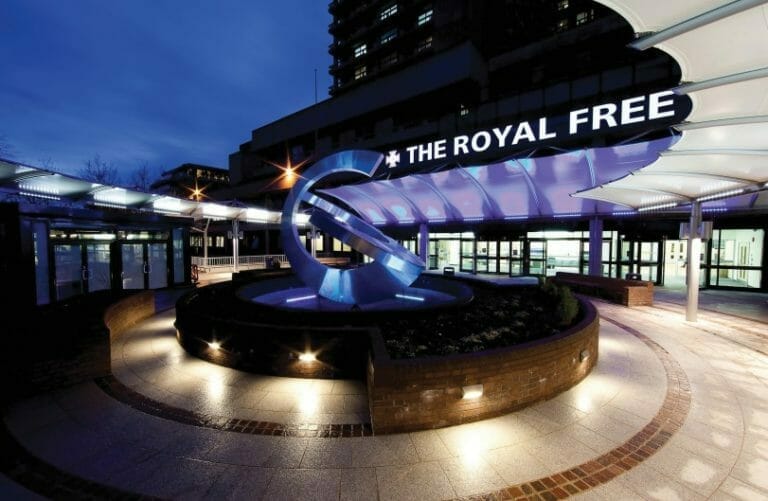Renal surgery

Our private Renal surgery services are provided at the Royal Free Hospital, Hampstead.
To find out more about our hospitals click here:
Here at the Royal Free Hospital London NHS trust, we are proud to offer the services of an expert renal team who have extensive experience caring for patients with kidney problems. We uniquely offer a service that is enhanced by our own Private Patients Unit (PPU), where profits are reinvested back into the NHS services and contribute to the high-quality care we provide. We combine the convenience, comfort and personalised attention of a private hospital with the very best state-of-the-art services, technology and the professional experience expected from a top London teaching hospital.
We offer tailored treatment and care for patients with kidney disease including both medical management and dialysis. Our range of services includes the following renal (kidney) surgical procedures:
Transplantation Surgery
A number of conditions can cause the kidneys to fail. These include diabetes, hypertension (high blood pressure), polycystic kidney disease and glomerulonephritis (damage to the part of the kidney that filters blood). Although renal failure can be managed with regular dialysis for some time, there are some limitations of this treatment, and it often places constraints on people who have to commit to it. A kidney transplant can be life-changing option for many people who are suffering from chronic kidney disease and renal failure. Kidneys for transplant are sourced from live donors or deceased organ donors. All organs for transplant need to meet certain criteria, both in terms of the quality of the organ itself and its compatibility with the patient. Those who receive a transplanted kidney will also need to take a number of long-term medications to prevent the body rejecting it.
Although it is a life-changing procedure, transplant surgery comes with risks related to both the procedure and the medications used afterwards. Sometimes a second or even third transplant may be needed. If there is organ rejection or failure of the transplanted kidney, further dialysis may become necessary.
Laparoscopic and Robotic Surgery
Laparoscopy, sometimes referred to as ‘key-hole surgery’ and robotic surgery combine innovative technology with advanced surgical techniques. These procedures have shorter operating times, reduced hospital stays and less scarring afterwards.
Laparoscopic surgery, involves using small cuts through the skin and tissue layers (usually through the back of the abdomen) to insert specially designed surgical instruments and a camera. The operation is then performed inside the body without the need for a larger incision. It is either performed directly or with robotic assistance by an experienced surgeon.
There are several different operations that can be done using these advanced techniques, including:
- Renal transplantation – the surgical insertion of a compatible replacement kidney sourced from a donor in the case of end-stage kidney failure
- Nephrectomy – removal of all or part of the kidney, most often used in cases of renal tumours or cancers
- Adrenalectomy – removal of the adrenal gland, a small organ that sits on top of each kidney and is responsible for secretion of hormones such as sex hormones and cortisol
- Live donor surgery – removal of a whole kidney from a living donor for transplantation. It is often performed at the same time as the transplantation surgery for the person receiving the organ
Dialysis-related Surgical Procedures
Dialysis is a medical treatment that involves passing the blood through a specially designed filtering system that removes toxins. This function is normally performed by the kidneys, so it is a life-saving treatment in the event of kidney failure. Dialysis is usually done through a blood vessel in the arm, or by an alternative method of filtration using special exchange fluids passed into the abdomen known as peritoneal dialysis. To make these treatments possible small operations are needed to put special access points in place within the body for the dialysis. These procedures can be performed using minimally-invasive techniques and include vascular access.
Parathyroid surgery – the parathyroid glands produce a substance called parathyroid hormone and are found in the neck. Removal of the parathyroid glands is a curative treatment for a condition known as hyperparathyroidism, where the parathyroid glands produce too much hormone. This causes calcium to build up and can lead to the formation of stones in the kidneys. Parathyroid surgery can be performed using minimally-invasive surgical techniques.
What we offer
Here at the Royal Free Hospital PPU, we are proud to offer you access to leading specialist experts in renal surgery and an experienced multidisciplinary team who are all dedicated to delivering the highest standards of care throughout your treatment.
Our specialists include:
Dr Peter Dupont
Dr Nasirul Ekbal
Dr Mark Harber
Dr Gareth Jones
Dr Philip Masson
Dr Shabbir Moochhala
Professor Alan Salama
Dr Kin Yee Shiu
Dr Robin Woolfson
